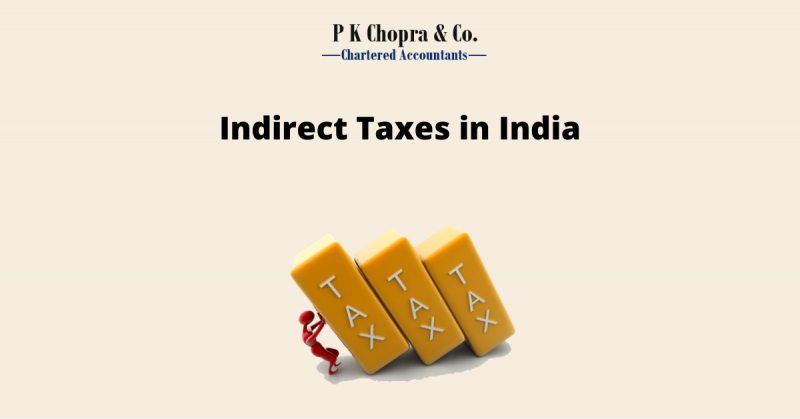Indirect Taxes in India
An Indirect taxes is collected by one entity in the supply chain and paid to the government, but it passed on to the consumer as a part of the purchase price of a good & Service
Indirect tax is tax imposed by the government on a taxpayer for good and services bought. Indirect tax is not levied on the income of the taxpayer and can be passed on from one individual to another.
Examples of indirect taxes include sales tax, entertainment tax, excise duty etc.
Different types of indirect taxes:
a)Custom Duty:
This a tax levied on the goods imported to India. Sometimes, Custom duty is also levied on products which are exported out of India.
b)Service Tax:
Applicable on the services provided by a company and paid by the recipient of their services, collected by and deposited with central government.
c)Excise Duty:
It is levied on the goods produced or manufactured in India, paid by the manufactures of goods. It is often recovered from the customers.
d)Sales Tax:
This tax was paid by the retailer , who would then shifts the tax burden to customers by charging sales tax on good and services.
e)Value Add Tax (VAT):
It was collected on the value of goods or services that were added at each stage of their manufacture of distribution and then finally passed on the customer.
f) Entertainment Duty:
Levied on all financial transactions related to entertainment such as movies shows, amusement park, video games, arcades, and sport activities, charged by the respective state government.
g)Securities Tax Transactions:
This tax is levied at the time of trade securities through India stock exchange.
Features of Indirect Taxes:
1)Shifts the burden of Tax:
Seller of the goods are required to pay the indirect taxesto the government.But they transfer the liability to their consumers.
2)Revenue for Government:
Since this type of tax cannot be easily evaded and is applicable on the most of commodities, it serves as a major revenue source for the govt. Its contribution is higher than the direct tax.
3)Tax liability:
The service provider or seller pays indirect taxes to the government , and the liability is transferred to the consumer.
4)Charged on Commodities:
Indirect taxes charge on material things such as goods and services. These are levied on the income you earn.
5)Paid by the consumer:
The liability of indirect tax is passed on by the sellers to the consumer. This tax is thus charged at the point of sales and is paid by the customer.
Advantage of Indirect taxes:
1)Convenienvce
2)Ease of Collection
3)Collection from the poor
4)Equitable Contributions
5)Limit Harmful Consumption

